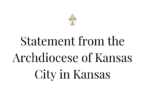by Joe Bollig
joe.bollig@theleaven.org
TOPEKA — The last of a trio of long-sought pro-life bills has survived an arduous, years-long legislative gauntlet and will soon be signed into law.
With this law — and others passed this session — significant changes for Kansas’ three existing abortion clinics are in the offing.
The Licensure of Abortion Clinics Act (House substitute for Senate Bill 36) was passed 97 to 26 by the House on March 31, and by the Senate (24 to 15) on April 27. It has been sent to the governor for his signature.
Governor Sam Brownback signed the two other landmark bills — the Abortion Reporting Accuracy and Parental Rights Act and the Fetal Pain and Late-Term Abortion Act — on April 12.
With the passage of this third bill, abortions at all stages come under improved scrutiny and health standards, said Rep. Lance Kinzer, R- Olathe.
“The importance of this bill is that it doesn’t deal merely with abortion at the late-term, but rather abortions at the earliest stage,” said Kinzer.
“It is important for pro-life voters in Kansas to recognize that,” he continued. “For all the success we’ve seen in the first two pieces of legislation passed, their impact on the bulk of abortions in Kansas — [those] before 22 weeks [of gestation] — was somewhat limited.”
This bill is nearly identical to bills passed by the Legislature in 2003 and 2005, but vetoed by Gov. Kathleen Sebelius, said Kathy Ostrowski, legislative director of Kansans for Life.
Newer provisions of the bill require that only Kansas-licensed doctors perform surgical abortions and administer abortion medications, prohibit so-called “webcam” pharmaceutical abortions supervised by a doctor over the Internet, and tie annual license renewals to announced and unannounced annual inspections.
A clinic licensing bill was necessary, said Ostrowski, because clinics themselves were unable or unwilling to address deficiencies, regulatory bodies were ineffective or passive, and patients themselves were unwilling to turn to authorities due to the nature of abortion procedures.
“Abortion clinics in Kansas have a long history of operating outside the bounds of the law,” said Michael Schuttloffel, executive director of the Kansas Catholic Conference. “Doctor Tiller’s [Wichita] clinic was notorious for performing late-term abortions on fully viable babies, [which was] illegal under existing Kansas law.”
“Doctor Krishna Rajanna’s clinic in Kansas City, Kan., was found to have been a bloody, filthy mess with aborted fetuses kept next to food,” he continued. “But the system was happy to let him continue. It was only after years of political pressure exerted by prolife individuals in and out of the Legislature that Rajanna was finally shut down.”
Existing regulation was deficient in many ways, one being reporting abortion deaths. In his testimony against the bill, Dr. Herbert Hodes, an Overland Park abortionist, revealed that there had been five maternal abortion deaths over the past five years — something that hadn’t been made public by the Kansas Department of Health and Environment or the Kansas State Board of Healing Arts.
“The standards that are in place are exceedingly limited,” said Kinzer. “The reality is that the need for this kind of legislation has been apparent to the Legislature for a number of years.”
Abortion procedures are not like other medical procedures, so it is completely appropriate for the state to address problems that are associated with this specific practice, he said.
“While we do have regulations concerning other kinds of outpatient clinics and hospitals, abortion clinics have been able to largely operate outside of the context of those regulatory schemes,” said Kinzer.
“The idea here is to set baseline standards with respect to facilities that are providing large numbers of abortions,” he continued, “and to provide the Kansas Department of Health and Environment with the authority they need to come in and conduct proper inspections and develop regulatory schemes that circumstances warrant.”
The new clinic standards are not unusual or unduly harsh, said Ostrowski.
“The standards [in the bill] were taken from the published standards of the National Abortion Federation, so they are not wild burdens imposed by pro-lifers,” she said. “More importantly, arguably more stringent standards were upheld for South Carolina by the Federal Fourth Circuit Court, and the U.S. Supreme Court refused to review the case.”
One effect of the bill will be to make abortion practices in Kansas less lucrative, said Schuttloffel.
“In concert with the other two bills signed by Governor Brownback, this legislation will make Kansas a very inhospitable environment for the abortion industry,” he said. “Hopefully, they will decide to leave Kansas altogether. Other states can then follow our model. That said, we still have work to do. This is not the last pro-life bill we need to pass in Kansas.”






